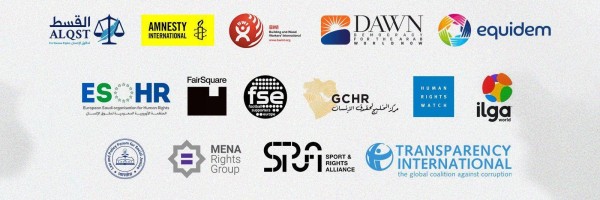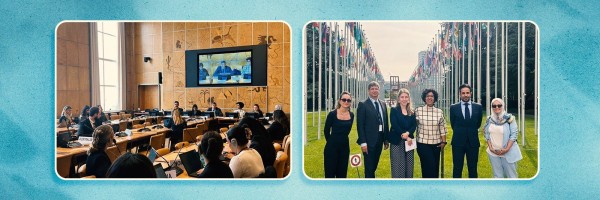Today’s confirmation of Saudi Arabia as host of the 2034 FIFA men’s World Cup, despite the well-known and severe risks to residents, migrant workers and visiting fans alike, marks a moment of great danger. It should also mark a moment for change.
As global and regional human rights organisations, trade unions, fans groups and organisations representing migrant workers, many of us have long highlighted the severe risks posed by Saudi Arabia’s hosting of mega-sporting events. By awarding the 2034 World Cup to Saudi Arabia without meaningful protections, FIFA has today decided both to ignore our warnings and discard its own human rights policies.
FIFA can never claim that it did not know the severity of the risks of hosting its flagship event in a country with such weak human rights protections. Nor can the national Football Associations voting to approve it. Today, there is no shortage of evidence of migrant workers being exploited and subjected to racism, activists sentenced to decades in prison for expressing themselves peacefully, women and LGBTQIA+ people facing legalized discrimination, or residents forcibly evicted to make way for state projects. It is evident that without urgent action and comprehensive reforms, the 2034 World Cup will be tarnished by repression, discrimination and exploitation on a massive scale.
FIFA has long accepted that it has a clear responsibility, in line with international human rights standards, to prevent and mitigate human rights violations and abuses connected to its activities, as well as to provide remedy for those to which it has contributed. By pursuing today’s decision regardless of the known risks, FIFA will bear a heavy responsibility for much of what follows.
In the process of awarding the 2034 World Cup, FIFA’s human rights policies have been exposed as a sham. Without competitive bidding, there was little prospect of bids being rejected – no matter how poor the human rights strategy, or how severe the outstanding risk. There was no consultation with people likely to be impacted by either tournament, nor specific or binding measures agreed that will ensure compliance with international labour standards or more comprehensive human rights reforms.
Together, we will continue to advocate for the rights of everyone in Saudi Arabia and beyond – migrant worker, resident, citizen, player, fan, activist or journalist – who may be impacted by the 2034 World Cup. While the Saudi population undoubtedly deserves to experience the joy that international sport can bring, this cannot come at any price. It must go hand in hand with measures to guarantee the rights that their government continues to deny them.
In the decade ahead we will mobilize the human rights community across the globe to ensure the violations and abuses of this World Cup are not ignored, and press for the fundamental changes needed to protect lives and expand freedoms. The Saudi authorities, FIFA, national Football Associations, FIFA sponsors and companies involved in the World Cup – or profiting hugely from it - all have human rights obligations and responsibilities, and we will seek to hold them accountable.
Signatories
- ALQST for Human Rights
- Amnesty International
- Building and Woodworkers International (BWI)
- Business and Human Rights Resource Centre (BHRRC)
- Equidem
- European Saudi Organisation for Human Rights (ESOHR)
- FairSquare
- Football Supporters Europe (FSE)
- Gulf Centre for Human Rights (GCHR)
- Human Rights Watch
- International Domestic Workers Federation (IDWF)
- Jafari Jata Solution, Kenya
- Law and Policy Forum for Social Justice (LAPSOJ), Nepal
- Migrant Defenders Organisation, Kenya
- Middle East Democracy Center (MEDC)
- Migrant-Rights.org
- International Trade Union Confederation (ITUC) – Africa
- Paurakhi Nepal
- Shramik Sanjal, Nepal
- Solidarity Center (SC)
- Sport and Rights Alliance (SRA)
Appendix – Quotes
Saudi diaspora and Middle East human rights organisations
Lina Alhathloul, Head of Monitoring and Advocacy, ALQST for Human Rights:
“It’s disheartening, if not surprising, that FIFA has awarded MBS’s Saudi Arabia hosting rights for the World Cup based on a heavily flawed bid, which side-stepped engagement with external stakeholders or the Saudi public themselves. Now it’s happened, urgent and sustained action is needed to mitigate the grave risks of labour and civil rights violations associated with the tournament, including by securing major and credible reforms.”
Khalid Ibrahim, Executive Director of the Gulf Centre for Human Rights (GCHR):
“We have documented too many labour abuses of migrant workers in Qatar at the previous World Cup, and there is nothing to indicate that Saudi Arabia will be any better. Saudi Arabia must be held to account for all of its human rights violations, and if it really wants to welcome people to the country for sporting events, then all those imprisoned for their peaceful human rights activities must be freed, including human rights defenders languishing in prison for decades.”
Abdullah Alaoudh, Senior Director for Countering Authoritarianism at Middle East Democracy Center (MEDC):
“The decision to award the 2034 World Cup to Saudi Arabia, one of the worst human rights abusers in the world, is an alarming sign that money and oil prevail over principles and values. Labor workers are dying while subjected to horrifying rights abuses with no way to seek justice in Saudi Arabia – all in order to build stadiums and allow MBS to whitewash his abysmal human rights record. And what’s more, just a few miles away from where these sporting events are set to take place, Saudi authorities are detaining and torturing many of our loved ones who only dared to peacefully exercise their fundamental rights.”
Taha al-Hajji, Legal Director of the European Saudi Organisation for Human Rights (ESOHR):
"The fate of foreign workers remains unknown thanks to the country’s flawed and ambiguous laws, absence of transparency, and lack of independent civil society institutions, which allow the Saudi authorities and Saudi companies to carry on exploiting workers without restraint.”
Trade unions and workers’ organisations
Bhim Shrestha, Co-founder of Shramik Sanjal, a worker-led network of migrant workers based in Nepal:
“We, the migrant workers, endure severe exploitation, and our vulnerability is often overlooked. Our lives matter - we fear for the lives of thousands of our migrant brothers and sisters who are at risk. FIFA must not turn a blind eye; the lives of migrants demand accountability and justice.”
Lewis Magondu, Programs and Advocacy Lead, Migrant Defenders Organisation, Kenya:
“Migrant workers embody the courage to dream beyond borders; we must honor their sacrifices by steadfastly protecting and upholding their rights.”
Willz, Founder, Jafari Jata Solution, Kenya:
"By awarding the 2034 World Cup to Saudi Arabia without addressing the severe risks to workers, residents, and marginalized groups, FIFA has not only failed its human rights mandate but also endangered lives. At Jafari Jata Solution, we stand with global allies to demand accountability and meaningful reforms. No celebration of sport should come at the cost of dignity, safety, and freedom."
Ambet Yuson, General Secretary of Building and Woodworkers International (BWI):
“Awarding Saudi Arabia the 2034 World Cup amounts to a global endorsement of exploitation and injustice for the hundreds of thousands of construction workers who will build the stadiums and infrastructure over the next decade. FIFA must be held accountable for the suffering that will follow. It is now more urgent than ever to engage with workers and trade unions to establish safeguards before the work begins, so that no worker pays for this World Cup with their rights, dignity, or lives.”
Joel Odigie, General Secretary of International Trade Union Confederation-Africa (ITUC-Africa):
"We demand genuine and broad industrial relations reform in law and practice in Saudi Arabia in an inclusive, collaborative and transparent manner."
Shawna Bader-Blau, Executive Director, Solidarity Center:
"Millions of Saudi and migrant workers support the Saudi economy each year, and each year hundreds of thousands of them face severe labor rights abuses such as wage theft, health and safety violations (including heat stress from extreme temperatures), and gender-based violence and harassment. We call on FIFA and corporations supporting the World Cup to ensure that Saudi Arabia adheres to all international labor standards for all workers in the Kingdom, and that workers receive full remedy for any violations."
Fans groups
Ronan Evain, Executive Director of Football Supporters Europe:
"Today is a dark day for human rights and football as a whole. This decision is scandalous and yet another example of how fans´ concerns about tournaments we are travelling to are repeatedly ignored. FIFA and its affiliated associations seem to have learnt nothing from the mistakes of the past and are not even able to comply with their own regulations regarding human rights."
Global human rights organisations
Steve Cockburn, Head of Labour Rights and Sport at Amnesty International:
“FIFA’s reckless decision to award the 2034 World Cup to Saudi Arabia without ensuring human rights protections are in place will put many lives at risk. FIFA knows workers will be exploited and even die without fundamental reforms in Saudi Arabia, and yet has chosen to press ahead regardless. The organization risks bearing a heavy responsibility for many of the human rights abuses that will follow.
“At every stage of this bidding process, FIFA has shown its commitment to human rights to be a sham. Meanwhile, its continued failure to compensate migrant workers who were exploited in Qatar provides scant confidence that lessons have been learned. FIFA must urgently change course and ensure that the World Cup is accompanied by wide-ranging reforms in Saudi Arabia, or risk a decade of exploitation, discrimination and repression.”
Phil Bloomer, Executive Director of Business and Human Rights Resource Centre:
“The benefits of a World Cup are vast – for football fans, for the local economy and for multinational companies – but those benefits must be shared. The awarding of the 2034 World Cup to Saudi Arabia while the legacy of Qatar 2022 still lies in tatters for thousands of migrant workers who toiled to make it possible should serve as a red flag. As the FIFA circus heads again to a region with the worst human rights protections on several fronts – labour rights, freedom of expression and the press – we cannot tolerate ‘business as usual’ again.
FIFA, its sponsors, and multinational companies likely already eyeing up lucrative infrastructure contracts have a legal and ethical responsibility to respect human rights. Particularly those of the most vulnerable migrant workers, who will undoubtedly form the backbone of the “historic transformation” to prepare Saudi Arabia for this global event in 2034.”
Mustafa Qadri, CEO of Equidem:
"The next World Cup is hurtling at lightning speed towards a human rights disaster. Equidem's staff who are former migrant workers themselves can personally speak to the violent and exploitative environment in Saudi Arabia. What's more, we are in touch with workers from the last World Cup in Qatar who are owed money from FIFA as well as the relatives of workers who were killed by the conditions of their labour.
Hundreds of thousands of people, many forced from their homes by climate change, will travel to Saudi Arabia to create the next World Cup. Neither FIFA nor the Saudi authorities have demonstrated that they will protect them from the abusive situations their desperation will force them to endure."
Minky Worden, Director of Global Initiatives, Human Rights Watch:
“FIFA has broken its own human rights rules to award Saudi Arabia the 2034 World Cup, and has done so in bad faith, refusing to compensate the families of thousands of migrant workers who died delivering its last World Cup in Qatar.
Human Rights Watch already has clear evidence migrant workers will be exposed to deadly harms while delivering the Saudi 2034 World Cup. Every sponsor, business, broadcaster, and national team associated with the Saudi World Cup will be tainted by widespread labor and other abuses unless there are wholesale, urgent human rights reforms are implemented—which FIFA has exerted zero effort to achieve so far.”




